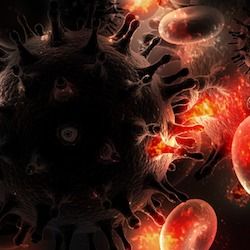Article
Combining Broadly Neutralizing Antibodies May Suppress HIV Without Antiretroviral Therapy
Author(s):
A pair of new studies suggests combining 2 new broadly neutralizing antibodies might be an effective way to achieve long-term HIV viral suppression without the use of antiretroviral therapy.

A pair of new papers is fueling hope that a combination of next generation broadly neutralizing antibodies might be able to achieve long-term viral suppression of HIV without the need for a daily antiretroviral pill.
Both articles came out of a collaboration between German scientists and researchers at Rockefeller University in New York. Though the research is based on a small pool of participants, it suggests combining anti-HIV antibodies could help defeat resistance and suppress the virus.
With antiretroviral drugs, researchers have previously found that administering a single therapy is usually ineffective, since the virus quickly develops resistance to the drug. Thus, antiretroviral therapy (ART) is typically administered in multi-drug combinations.
Broadly neutralizing antibodies have one key advantage over antiretroviral therapy: they have a longer half-life and thus don’t require the daily, lifelong dosing regimen currently required of ART users.
As with antiretroviral therapy, while broadly neutralizing antibody (bNAb) therapy appears to result in a significant reduction in viral load, administration of a single antibody therapy tends to result in a short-lived benefit as the viral develops resistance.
Unfortunately, unlike with ART, combinations of first-generation bNAbs have so far failed to show a significant impact on viral load.
In the new research, scientists from the German Center for Infection Research and the University Hospital Cologne partnered with Rockefeller University on a phase 1b clinical trial testing whether the combination of 2 new highly potent bNAbs (3BNC117 and 10-1074) might turn the tide and demonstrate efficacy similar to that of combination antiretroviral therapy.
The data were promising.
“The results of this clinical trial highlight the potential for antibody combinations to maintain long-term control of HIV,” said Henning Grüll, MD, resident physician at the Institute of Virology of the University Hospital Cologne.
In the first study, 7 patients were given infusions of the combination bNAb therapy. The treatment was well-tolerated in all patients, and 4 of the patients saw viral load reductions averaging 2.05 log10 copies per milliliter. The reductions were sustained for 3 months following the initial infusion. None of the patients in the study developed resistance to the therapy.
In the second study, 9 patients who had been taking ART stopped that therapy and instead underwent a series of infusions of the bNAb combination in order to see if viral suppression could be maintained without the use of antiretroviral therapy. All of the patients in the study sustained their suppression for at least 15 weeks, and some kept the virus in check for more than 30 weeks. The average length of suppression was 21 weeks. As with the other study, none of the patients developed resistance to the therapy.
In both cases, the authors cautioned that the results would need to be confirmed in larger studies. However, together they suggest the latest bNAbs, when taken in combination, could achieve a therapeutic effect similar to ART with less of a medication adherence burden.
The first study, “Safety and antiviral activity of combination HIV-1 broadly neutralizing antibodies in viremic individuals,” was published Sept. 26 in Nature Medicine. The second study, “Combination therapy with anti-HIV-1 antibodies maintains viral suppression,” was published in Nature on the same day.
2 Commerce Drive
Cranbury, NJ 08512
All rights reserved.





